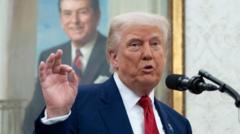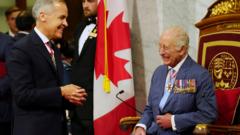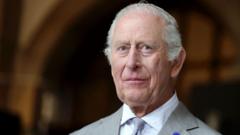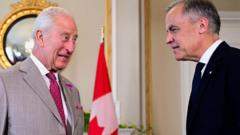King Charles’ recent Speech from the Throne emphasized Canada’s ambitions in a changing world, revealing strategic plans for bolstering trade relations, addressing domestic challenges such as housing and crime, and enhancing military capabilities, all while fostering a unified national identity.
Canada’s Future: Highlights from King Charles’ Throne Speech
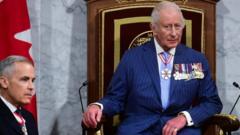
Canada’s Future: Highlights from King Charles’ Throne Speech
Insights into King Charles' address outlining Canada's path under Prime Minister Mark Carney amidst U.S. tensions and global challenges.
In a historic Speech from the Throne delivered by King Charles, Canada has outlined its aspirations and foundational challenges as Prime Minister Mark Carney's administration begins to shape the nation's trajectory. The speech, characterized by an undercurrent of national pride, reflected on Canada's identity, independence, and the evolving dynamics with the United States, particularly amidst trade tensions. Here are the key takeaways from this significant address.
The opening of the speech conveyed a strong message of sovereignty in light of potential economic confrontations with the U.S., although the speech discreetly avoided directly naming U.S. President Donald Trump. The King expressed admiration for Canada’s diverse and dynamic landscape, lauding the nation's collective resilience and a renewed sense of unity. His remarks, centered around the crown as a historical symbol of continuity, reinforced Canada's commitment to safeguarding its identity in times of trial.
A prominent theme in the address was Canada’s response to a world fraught with unprecedented challenges and uncertainties. The King highlighted the shift in global trade dynamics and the urgency for Canada to solidify and expand its trading relationships beyond North America, particularly with its European allies. "Canada stands at a pivotal moment," the King asserted, providing an opportunity for an economic transformation on a scale not seen since the Second World War.
The speech also dedicated attention to domestic policy, detailing Carney’s agenda to manoeuvre through economic adversities. This included ambitious infrastructure initiatives and plans to enhance Indigenous ownership of large projects. Furthermore, the introduction of forthcoming legislation aimed at dismantling trade barriers between provinces was outlined, as these hurdles reportedly cost the Canadian economy up to C$200 billion annually.
Housing affordability emerged as another focal point, as the country grapples with skyrocketing property prices. The government pledged to accelerate construction efforts to achieve 500,000 new homes annually and to implement measures that cut down development costs for housing projects aimed at attracting first-time homebuyers.
Crime rates and safety also surfaced prominently in the address, with proposals for stricter penalties for serious offenses and commitments to bolster public safety through legislative reforms.
On the military front, Canada is being urged by NATO partners, particularly the U.S., to enhance its defense spending. The King's address echoed this call, with commitments to increase military investment and solidify defense partnerships with European nations.
As Canada navigates both perilous waters and promising opportunities, King Charles' speech serves as a beacon for the nation, emphasizing unity, determination, and strategic growth amidst the world’s ever-evolving landscape.




